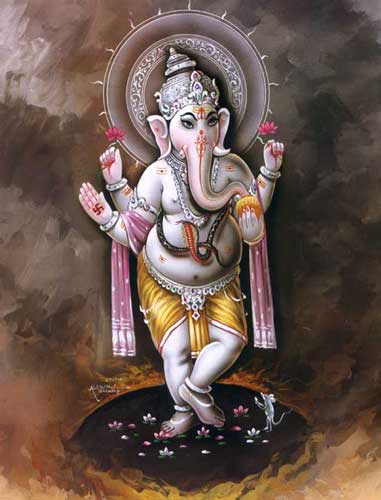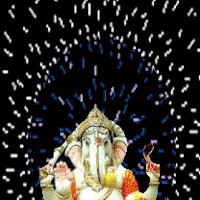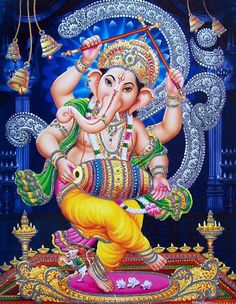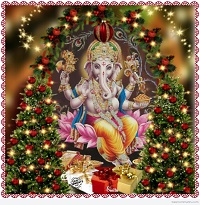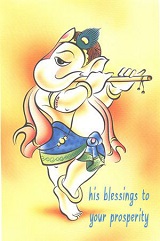Invocations
A Small Poem
What Is Grace?
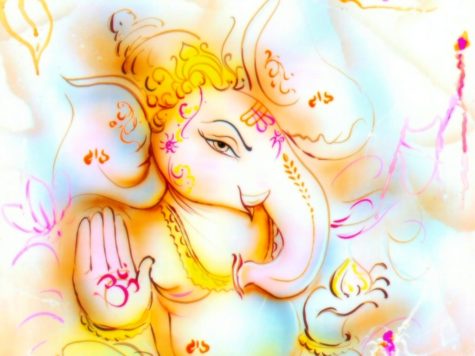
“What about the grace of the Diety?” seekers ask. Grace is received from the God when you are consistent in your worship, consistent in your discipline, consistent in your bhakti, your devotion.
With such a foundation in your life, a great shakti, a force or power, will come from Lord Ganesha. This is grace. It is uplifting. It comes unexpectedly. When grace comes, your mind may change and your heart may melt. Your sight will become clear and penetrating. You may say. “I have been graced to see everything differently.” New doors will begin to open for you, and as you go through them, your life will become more full, more wonderful. And the grace of it is that it would not have ordinarily happened to you.
Seekers also inquire, “What is the difference between grace and a boon from the Gods?” Grace is not exactly a boon. A boon comes as the result of something that you ask for and receive. A boon is quite specific. Grace comes because of the state of the soul in conjunction with its particular karma. It comes because we have done everything right up to a certain point in time according to the laws of dharma. It is then that the grace of the God comes.
Grace is not for a specific need or event in your life, as a boon would be. Grace is more of a complete transformation – a metamorphosis. After receiving grace of a God, the devotee can never be the same again, never look at life again in the old way.
By grace we are directed deeper into spiritual life, pointed in the right direction, carefully guided on the San Marga, the straight path to your supreme God. After grace has been received, our thoughts are enlivened, our life is inspired with enthusiasm and energy, and we live daily in the joyous knowledge that everything is all right, everything is happening around us in accord with our karma, our dharma, and God’s gracious will.
from Loving Ganesa
by Satguru Sivaya Subramuniyaswami
Praying To Ganesha
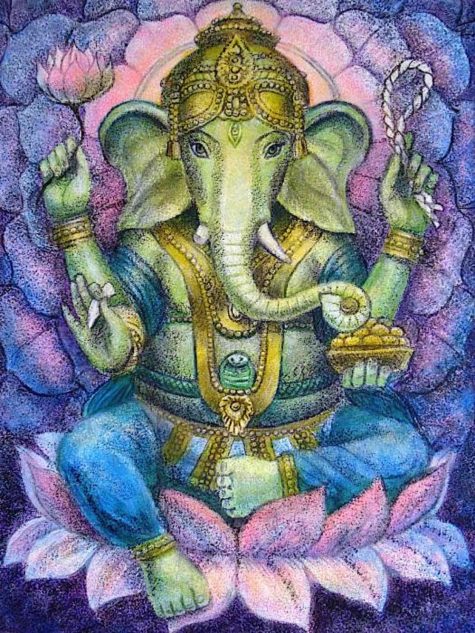
Prayers of supplication are requests, pleadings, or entreaties presented to the Deity in the spirit of personal surrender and loving devotion. Something specific is being asked for, a specific problem is being laid at the Lord’s Holy Feet.
Such supplications to the one-tusked Lord are given unconditionally, with full trust that He will do what is best for us, though not necessarily what we might think is best. We do not demand of the Lord; for He, like a parent, provides not as we desire, but as we truly need. Prayers of supplication may come forth in the natural language of our hearts.
Leaving a problem at His holy feet means we let it be there and do not carry it home with us. Nor do we worry or wonder about how it will be handled, when it will be taken care of, or if it will be taken care of at all. In full unquenchable faith we leave the matter there, at the feet of the God, and walk away from the temple or the shrine, feeling that release has started and solution will be forthcoming. We must have this kind of faith for religion to work within us.
To carry home with us the same problems, fears, and worries would be to take back the offering we have given the Deity to dissolve. This is like the rich and famous who buy with gifts and do not give at all, slyly expecting more than something in exchange, gaining papa rather than punya and not knowing the difference. The course of events later show how He works for our ultimate spiritual welfare.
from Loving Ganesa
by Satguru Sivaya Subramuniyaswami
When Prayers Don’t Work
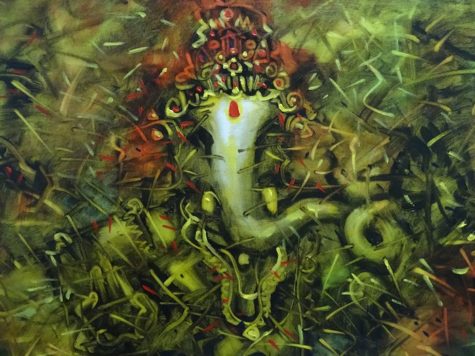
What does it mean when an obstacle is encountered despite our sincere supplication of Lord Ganesha?
It may mean that the time, the means, or the goal itself is not right for our karma and dharma. The architect presents his finished plans to the engineer. They are rejected for one technical reason or another. The executive presents a completed letter to the president. It is rejected as not being explicit enough in the third paragraph. The architect and the executive were equally sincere in presenting their work. The engineer and the president were performing their duty as well.
Lord Ganesha loves us. He is a loving God who guides, governs, and controls with speed and accuracy when the plan is perfect, deliberates long and rejects often when the plan needs revision.
Take the plan back into your mind. Search your own superconsciousness for the greater ideas, and revise your efforts with confidence. Seek for the right timing and proceed with confidence when you know the timing to be right.
“When the will rises and commands, even the Gods are willing to obey,” or to give immediate cooperation, to guide, and enhance our efforts. We must work our minds in close cooperation with the mind of Lord Ganesha, and then success is certain. Thus, this God is called Bhaktavighnavinasana, He who destroys the obstacles of the devotees.
From: Loving Ganesha
Shlokas on Lord Ganesha
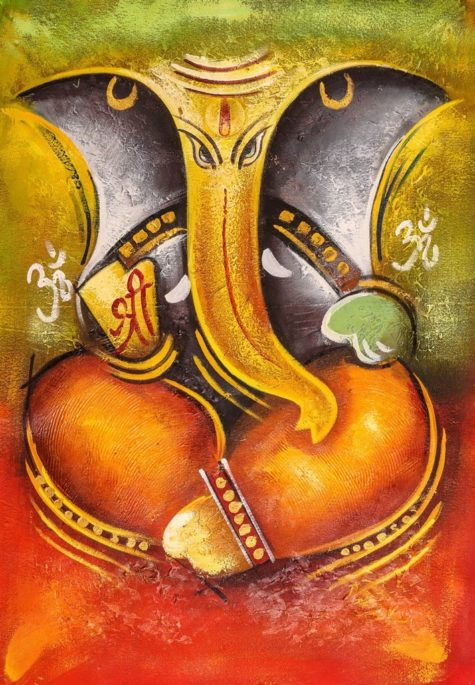
What is a Shloka?
Shloka is a Sanskrit word referring to a verse, proverb, hymn or poem that uses a specific meter. It is considered as the classic basis for epic Indian poetry as its use is widespread in traditional Sanskrit poems. Among the famous texts written entirely in shlokas are the “Ramayana” and “Mahabharata.”
Technically, a shloka can be made up of any sort of four-line stanza with up to 26 letters in a single line. In terms of yoga practice, it is likely that a yogi who meditates will come across this classical form of verse in the mantras that can help one meditate effectively.
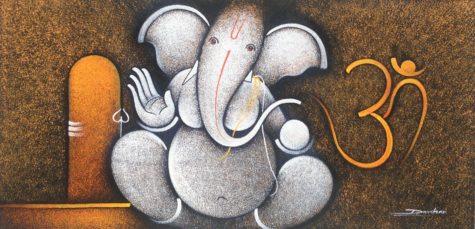
Shlokas on Lord Ganesh:
Shuklaambara Dharam Vishnum
Shashi Varnam Chatur Bhujam
Prasanna Vadanam Dhyaayet
Sarva Vighna Upashaanthaye
Meaning: We meditate on Lord Ganesha – who is clad in white (representing purity), who is all pervading (present everywhere), whose complexion is gray like that of ash (glowing with spiritual splendor), who has four arms, who has bright countenance (depicting inner calm and happiness) and who can destroy all obstacles (in our spiritual and worldly path).

Vakratunda Mahakaaya
Suryakoti Samaprabha
Nirvighnam Kuru Mey Deva
Sarva Kaaryeshu Sarvada
Meaning: The Lord with the curved trunk and a mighty body, who has the luster of a million suns, I pray to thee Oh Lord, to remove the obstacles from all the actions I intend to perform.

Agajaanana Padmaarkam
Gajaananam Aharnisham
Anekadantham Bhaktaanaam
Ekadantam Upaasmahey
Meaning: I worship day and night that elephant faced Lord Ganesha who is like sun to the lotus face of Mother Parvati. Giver of many boons, the single tusked Ganesha, I salute Thee to give me a boon.

Gajaananam Bhoota Ganaadhi Sevitam
Kapitta Jamboophaala Saara Bhakshitam
Umaasutam Shoka Vinaasha Kaaranam
Namaami Vighneswara Paada Pankajam
Meaning: The Lord with the elephant face, served by all the Ganas, One who takes as His food, the essence of Kapitta and Jamboophala (these are two favorite fruits of Ganesha), son of Uma (Mother Parvati), destroyer of misery of the devotees, controller of obstacles, we worship Your Lotus Feet.

Ganaanaam Twam Ganapathi Gam Havaamahe
Kavim Kaveenaam Upamasra Vastamam
Jyeshta Raajam Brahmanaam Brahmanaspatha
Aanashrunvanna Oothibhi Seedha Saadanam
Meaning: We invite You, the Lord of spiritual faith (of Lord Shiva). You are the wisest among the wise, the best to be given as a standard of comparison. You are the senior Lord, Lord of the Vedic mantras, listening to our prayers. Please visit our home with prosperous things and be seated here.
 GANESH GAYATHRI
GANESH GAYATHRI
Tatpurushaaya Vidmahe
Vakratundaaya Dheemahe
Tanno Danthihi Prachodayaat
Meaning: We meditate on that super power, we invoke the single tusked boon giver, Ganesha.

GANESHA PANCHARATNAM
Mudakaraatha Modakam Sada Vimukti Saadhakam
Kalaadharaavatamsakam Vilasiloka Rakshakam
Anaaya Kaika Naayakam Vinasitebha Daityakam
Nataasubhasu Naashakam Namaami Tham Vinaayakam.
Meaning: I prostrate before Lord Vinaayaka who joyously holds modaka in His hand, who bestows salvation, who wears the moon as a crown in His head, who is the sole leader of those who lose themselves in the world. The leader of the leaderless who destroyed the elephant demon called Gajaasura and who quickly destroys the sins of those who bow down to Him, I worship such a Lord Ganesha.

Natetaraati Bheekaram Navoditaarka Bhaasvaram
Namat Suraari Nirjanam Nataadhi Kaapa Duddharam
Suresvaram Nidheesvaram Gajesvaram Ganeshvaram
Mahesvaram Samaasraye Paraatparam Nirantaram.
Meaning: I meditate eternally on Him, the Lord of the Ganas, who is frightening to those not devoted, who shines like the morning sun, to whom all the Gods and demons bow, who removes the great distress of His devotees and who is the best among the best.

Samasta Loka Samkaram Nirasta Daitya Kunjaram
Daredarodaram Varam Vare Bhavaktra Maksharam
Krupaakaram Kshamaakaram Mudaakaram Yasaskaram
Manaskaram Namaskrutaam Namaskaromi Bhaasvaram.
Meaning: I bow down with my whole mind to the shining Ganapati who brings happiness to all the worlds, who destroyed the demon Gajasura, who has a big belly, beautiful elephant face, who is immortal, who gives mercy, forgiveness and happiness to those who bow to Him and who bestows fame and a well disposed mind.

Akimchanaarti Marjanam Chirantanokti Bhaajanam
Puraari Poorva Nandanam Suraari Garva Charvanam
Prapancha Naasha Bheeshanam Dhananjayaadi Bhushanam
Kapola Daana Vaaranam Bhajaey Puraana Vaaranam.
Meaning: I worship the ancient elephant God who destroys the pains of the poor, who is the abode of Aum, who is the first son of Lord Shiva (Shiva who is the destroyer of triple cities), who destroys the pride of the enemies of the Gods, who is frightening to look at during the time of world’s destruction, who is fierce like an elephant in rut and who wears Dhananjaya and other serpents as his ornaments.

Nitaantikaanta Dantakaanti Mantakaanta Kaatmajam
Achintya Rupa Mantaheena Mantaraaya Krintanam
Hrudantarey Nirantaram Vasantameva Yoginam
Tameka Danta Meva Tam Vichintayaami Santatam.
Meaning: I constantly reflect upon that single tusked God only, whose lustrous tusk is very beautiful, who is the son of Lord Shiva, (Shiva, the God of destruction), whose form is immortal and unknowable, who tears asunder all obstacles, and who dwells forever in the hearts of the Yogis.

Mahaaganesa Pancharatnam Aadarena Yonvaham
Prajapati Prabhaatake Hrudi Smaran Ganesvaram
Arogatham Adoshataam Susaahitim Suputrataam
Samaahitaayu Rastabhootim Abhyupaiti Sochiraat.
Meaning: He who recites this every morning with devotion, these five gems about Lord Ganapati and who remembers in his heart the great Ganesha, will soon be endowed with a healthy life free of all blemishes, will attain learning, noble sons, a long life that is calm and pleasant and will be endowed with spiritual and material prosperity.
From: Saidarshan.org
Twelve Names of Ganesha

We already explored the 108 names of Ganesh, but these twelve names are in the form of a shloka, which is a verse, proverb, hymn or poem that uses a specific meter. This group of verses is said to be sage Narada’s offering to Lord Ganesh. So, if you like doing these Sanskrit chants, here are some more. I think this is meant to be recited in its entirety, rather than bits and pieces.

Pranamya Shirasa Devam
Gauriputram Vinaayakam
Bhakataavaasam Smare Nityam
Aayuh Kaamartha Siddhaye
Meaning: Every day, I bow down to that Lord, the son of Gowri, the Lord one who lives in the heart of the devotees, blessing them always with good health and prosperity.
Prathamam Vakratundam Cha
Ekadantam Dviteeyakam
Thriteeyam Krishna Pingaaksham
Gajavaktram Chaturthakam
Meaning: Starting from here the twelve names of Ganesha are mentioned and he is worshiped in those different forms. The first as the Lord with the curved trunk; second, as the one with only one tusk, third, as the one with black (red/brown) eyes, fourth, as the one with giant structure.
Lambodaram Panchamaam Cha
Shashtam Vikatameva Cha
Saptamam Vighnaraajendram
Dhoomravarnam Tathaashtamam
Meaning: Fifth, as the one with a big (long) stomach, six, as the one with a huge body Seven, as the remover of obstacles, eight, as the one with smoke gray color
Navamam Phaalachandram Cha
Dasamam Tu Vinaayakam
Ekaadasam Ganapatim
Dvaadasam Tu Gajaananam
Meaning: Ninth, as the one with moon on the front of His head, tenth, as the foremost leader, eleventh, as the leader of the ganas, twelfth as the one with elephant face.
Dvaadasaitaani Naamaani
Trisandhyam Yah Pathernnarah
Na Cha Vighna Bhayam Tasya
Sarva Siddhikaram Prabho
Meaning: Any person, who remembers these twelve names of Ganesha, three times in a day, will have all their obstacles and fear removed and will attain success.
From: Saidarshan.org
Prayers To Ganesh
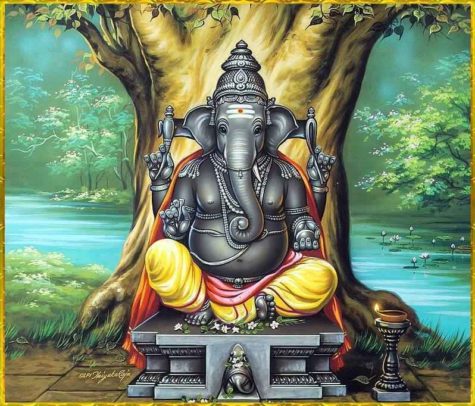
Here is an assortment of prayers for specific situations. These can be said aloud, or silently while visualizing Ganesh or looking at an image of Him. A nice little ritual can also be made with these prayers. Here’s how:
- Light a candle and burn some sandalwood incense.
- Write the prayer on a piece of paper.
- Imagine that you are now putting that prayer, that request, that issue, that problem into the capable hands of the God.
- As you imagine the above, light the paper and allow it to burn completely.
- While the paper is burning let go completely of all worry, anxiety, fear, or need to control. Give it completely up.
- Disperse the ashes in running water.
![]()
Moments of Decision
Aum Sri Ganeshaya Namaha
Great Lord of Wisdom, here I stand with so many decisions to make, with so many ways to turn. I beg for your grace. Fill me with righteous judgment and clear discrimination as I lay all confusion at Your holy feet and immerse myself solely in You.
Aum Ganesha Sharanam Sharanam Ganesha
Times of Need
Aum Sri Ganeshaya Namaha
Ganapati, Lord of Ganas, I, too, am a deva under Your command. I know I can never ever separate myself from the intricate mind of the supreme intelligence. O Lord who destroys the obstacles of His devotees, grant me protection, guidance and help in this hour of need. (State your need or troubles.)
Aum Ganesha, grant me Your grace, Sharanam Ganesha
Family Welfare
O Lord Ganesha, holder of the noose and goad, sweets, fruits and sugarcane, please provide for the welfare of my family. Guide prosperity and abundance to our door. But while we wait and mostly see only our wants and needs, please help us feel within our home Your goodness and Divinity, which no calamity can conceal.
Aum Ganesha Sharanam Sharanam Ganesha
Freedom from Fear and Anger
Omnipresent Lamboradara, pure and peaceful doer of all good. Take away my fear and anger. Let me see Thee everywhere and at all times. Show me the truth that there is no intrinsic evil. Remove all barriers in my mind to understanding, true trust, and love. Guide me to a harmonious life and righteous success in the fulfillment of my dharma.
Aum Ganesha Sharanam Sharanam Ganesha
Appreciation
Aum Sri Ganeshaya Namaha
Peerless One, industrious indweller in all, we see You in the full warmth of the Sun, in the full life of Earth and the orderliness of all the turning planets. O Lord and lover of intellect, You are the intricate knowledge blossoming in the mind of the people. O Lord who rules the mind of each and all who worship You, because of You, chaos never was nor will it ever be.
Aum Ganesha Sharanam Sharanam Ganesha
Morning Prayer
Aum Lord Ganesha, you make the flowers grow, You keep the Earth going around the Sun. All day You keep things going right. You are Lord of the devas. I am one of Your devas, too. Help me to think of the needso of others, and to be kind to everyone I meet. Help me to think of You first before beginning something new and to always do what is right and kind.
Aum Ganesha Sharanam Sharanam Ganesha
Bedtime Prayer
Aum, Lord Ganesha, nightime is here and the moon is in the sky above, reminding me of your crescent tusk. Remain with me, Ganesha, through the night, in my deepest sleep, in my inner experiences, as You have remained with me during my daytime, outer encounters. Let me never forget You, even in my dreams. May we as a family be guided by Your loving wisdom, even there.
Aum Ganesha Sharanam Sharanam Ganesha
from Loving Ganesha
by Satguru Sivaya Subramuniyaswami
Sixteen Names of Ganesha
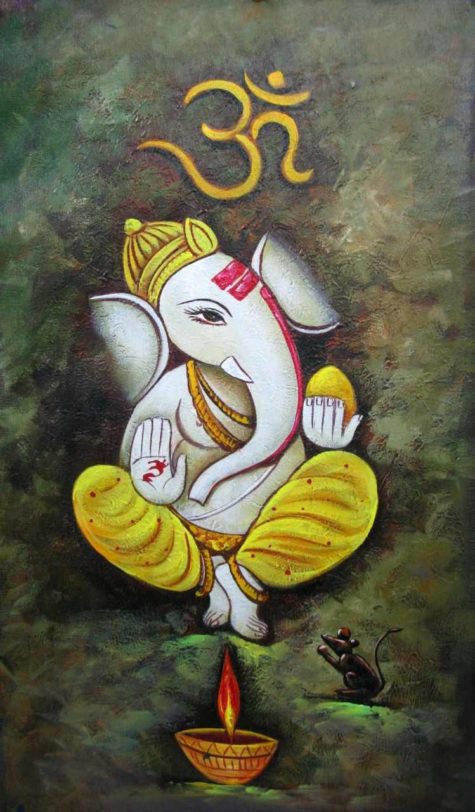
Sumukhascha Ekadanthascha
Kapilo Gajakarnakaha
Lambodarascha Vikato
Vighnaraajo Ganaadhipaa
Meaning: The various names and associated forms of God Ganesha are enumerated and need to be meditated upon here – the one with an auspicious face, the single tusked Lord, the one who is of red color, the one with the ears of an elephant, the one with a big stomach, the one with a jovial disposition, the controller of obstacles, the Lord of the Ganas.
Dhoomaketur Ganaadhyashah
Phaalachandro Gajaanana
Vakratundo Shoorpakarno
Heyrambho Skandapoorvajaha
Meaning: The one of smoke gray color, the leader of the ganas, the one who has moon in the front of his forehead, the elephant faced one, the one with a curved trunk (or broken tusk), the one with big (basket like) ears, the one who is heroic like a buffalo, the elder brother of Skanda (Skanda is another name for Lord Subrahmanya)
Shodashaitaani Namaani
Yah Pateth Srunuyaadapi
Vidyaarambhe Vivahe Cha
Praveshey Nirgamey Tatah
Sangraamey Sarva Kaaryeshu
Vighnas Tasya Na Jaayathe
Abheepsitaartha Siddhyartham
Poojitoya Surairapi
Sarva Vighna Chhido Tasmai
Sree Ganaadhipataye Namaha
Meaning: Whoever the one who recites and listens to these sixteen names at the beginning of studies, at the time of marriage, while entering or departing a place, or at the battle field, all their obstacles will be removed. Even the Gods worship Lord Ganesha to receive the fulfillment of their actions. Oh Lord Ganesh, the One who has this power of destroying all the obstacles in the way of the devotees, I prostrate before you.
From: Saidarshan.org
Other Ganesh Mantras
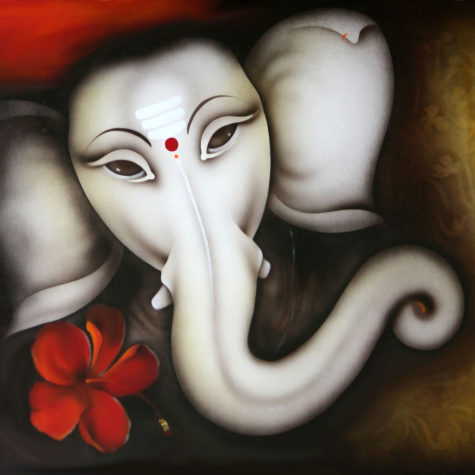
- Aum Shri Ganeshaya Namah.
This is the mantra of invocation, adoration and worship. It means ” Praise to Lord Ganesha“. It is repeated at the beginning of religious ceremonies and mantra recitation to invoke Ganesha’s blessings for the auspicious beginning of a task, project, change of life, community undertaking or simply to offer Him praise.
This mantra is usually taught to children for their good education. It increases their memory power, and they become successful in their examinations. Of course, people of any age may use this mantra when taking courses in a school or university, and for success in attaining their degree.
- Aum Gum Ganapataye Namaha.
This is Lord Ganesha’s mula (“root”) mantra. It is also known as His bija mantra, for it combines Ganesha’s bija (“seed”) sound, “gum,” with the phrase, “Praise be to Ganapati.” This is a mantra from Ganapati Upanishad. One may always use it before beginning a journey, new career or job, or before entering into any new contract or business so that impediments are removed and your endeavor may be crowned with success.
- Aum Vakratundaya Hum.
This is a very powerful mantra. When something is not working properly, individually or universally, nationally or internationally, or when the minds of the people turn crooked, negative, depressed or discouraged, the attention of Ganesha may be drawn by this mantra to straighten their ways. The HUM symbolizes “Delay no more, my Lord, in straightening the paths of the crooked-minded ones.”
In addition, this mantra could also be used for healing any spinal deficiency, such as curvature of the spine or curved limbs. Dedicate 1,008 repetitions of this holy word to straighten and heal such deficiencies.
- Aum Kshipra Prasadaya Namah.
Kshipra means instantaneous. If some danger or negative energy is coming your way and you don’t know how to get rid of that trouble, with true devotion, practice this mantra for quick blessing and purification of one’s aura.
- Aum Shrim Hrim Klim Glaum Gam Ganapataye Vara Varada Sarva Janamme Vashamanaya Svaha.
There are several bija (seed) mantras in this mantra . Among other things, it signals, “Shower Your blessings, O Lord. I offer my ego as an oblation.”
- Aum Sumukhaya Namah.
This mantra has a lot of meaning, but to make it simple, it means you will be always very beautiful in soul, in spirit,in face, everything. By meditating on this mantra, very pleasing manners and a beauty comes on you. Along with that comes peace, which constantly dances in your eyes; and the words you speak are all filled with that power of love.
- Aum Ekadantaya Namah.
Ekadanta refers to one tusk in the elephant face, which means God broke the duality and made you to have a one-pointed mind. Whoever has that oneness of mind and single-minded devotion will achieve everything.
- Aum Kapilaya Namah.
Kapila (red) means that you are able to give color therapy. You are able to create colors around yourself and around others, bathe them in that color and heal them. As per the mantra you create, so will you create the colors. Another meaning is “wish cow,” the “cow of plenty.” It means that whatever you wish, that comes true. There is a wish-cow inside you. Whatever you wish, especially for healing others, comes true immediately.
- Aum Gajakarnikaya Namah.
The ears of Ganesha, the elephant, are constant fanning, which means people may talk a lot,but you are not receiving inside anything other than that which is important.It also means that you can sit anywhere and tune this cosmic television (the body) with seven channels (chakras) and all 72,000 nadis, to any loka and be able to hear ancestors, angels, the voice of God or the voice of prophets. That kind of inner ear you will develop through this mantra.
- Aum Lambodaraya Namah.
This means you feel that you are this universe. It means that all the universes are within you. Like an entire tree is in the seed, the whole universe is in the sound of creation, which is Aum, and that Aum consciousness in you makes you feel that you are the universe. Therefore, if you say, realizing the oneness with the universe, “shanti to the world” every day, then the grace of God will come and there will be world peace, universal peace. It is the universes within Aum and Aum within you.
- Aum Vikataya Namah.
This means realizing this world as a dream or a drama. When you are in that high consciousness, this whole world looks like a dream. All of us have taken a role. We have to play our role in life as wife or husband or children or citizens, all consistent with the role we have taken.
When an actor bitten by a sponge cobra that is brought on the stage falls, the entire audience cries; but that boy who has fallen knows it was not a real cobra and he is not dead. Life is a drama –definitely life in this material world, this physical world of ego, is a drama. But inside, like the boy on the stage who is quite happy knowing that he didn’t die by the bite of the sponge cobra, like that, the truth never dies in us; it is immortal. So everything else you consider as drama. That consciousness comes to you by knowing this mantra.
- Aum Vighna Nashanaya Namah.
This mantra invokes the Lord Ganesha to remove every impediment in your life and in your works. By constant meditation on this mantra, all obstacles and blocked energy in your physical and astral bodies are released.
- Aum Vinayakaya Namah.
Vinayaka is the name of Ganesha in the golden age. So by realizing this mantra, your life will have a golden age. In your office, in your work, you’ll be the boss. Vinayaka means something under control. Vinayaka means the Lord of problems.
- Aum Ganadhyakshaya Namah.
This mantra is so important. Suppose you have a group, a country, neighbors, or any kind of group therapy, group healing or a whole country needing healing, then you have to bring that entire group to your mind’s arena and say this mantra. A group healing takes place by this mantra.
- Aum Bhalachandraya Namah.
In Sanskrit, bhala means the forehead center. Chandra means the crescent moon. Bhalachandra means that chakra from where the nectar drips. That is the secret of all healing. It is to feel yourself as Siva, identifying yourself with the Truth and feeling constantly that you are carrying the crescent moon, the symbol of growth and nectar and peace.
from Loving Ganesa
by Satguru Sivaya Subramuniyaswami
The 108 Names of Ganesha
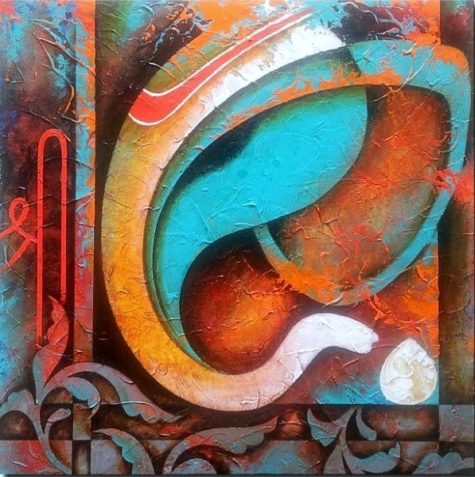
Chanting the 108 names of Lord Ganesha is part of the traditional daily worship called a Puja. It is called the Vighnesvarashtottara Satanamavalihor “garland of Ganesa’s 108 names”. The names are attributes of the Diety, each one delineating an aspect of His infinite and indescribable nature.
Each name is preceded by the mantra Aum (Om) and followed by namah (Namaha) meaning “obeisance, praise, adoration,” or “homage” to.
![]()
Aum Akhuratha Namah
One With Mouse As His Charioteer
Lord Ganesha, with a huge body, has a small mouse as his charioteer. The hugeness matters little when the study of life principles is considered. The soul may be the greatest or the smallest. This represents life in its totality and Lord Ganesha is suggestive of these cosmic aspects.
![]()
Aum Alampata Namah
The Eternal
By whose puissance this world of illusion is manifest, whose creation is this universe, who is the Lord of all gods and creation, he is the Eternal, Lord Ganesha.
![]()
Aum Amit Namah
One Who Has No Comparison
Ganesha is the embodiment of ‘OM’, the symbol of the Great God. He is the Eternal Spirit, the Beginning of all beginnings, beyond comparison.
![]()
Aum Anantachidrupamayam Namah
Infinite And Consciousness Personified
He who is the root cause of the worlds, who is uniquely manifest in the hearts of all, can be realized only by concentrated meditation. Lord Ganesha, the Infinite, is beyond distinctions and beginning.
![]()
Aum Avaneesh Namah
Master Of The Whole Earth
As a rotund, elephant-faced figure, Lord Ganesha is the Lord and Master of the whole earth.He is the protector of the visible world and leader of the helpless, destroying all evil and obstacles.
![]()
Aum Avighna Namah
Without Obstacles
The mighty, massive Ganesha, mounted on his vehicle, bestows everything desired if his devotees chant his name with fervor and devotion; He is also responsible in keeping away all obstacles from their path.
![]()
Aum Balaganapati Namah
The Beloved Child
Lord Ganesha is adored by all the gods, even by the four-faced Brahma, and Lord Indra. As the elephant-faced child, he is the color of the rays of the rising sun.
![]()
Aum Bhalchandra Namah
Sporting The Moon Crest
A moon crest adorns the forehead of Lord Ganesha. It denotes a pot of nectar, providing divine coolness to the wearer. It also denotes intelligence and mental, enlightenment, the moon being the symbol of mind and peace.
![]()
Aum Bheema Namah
Gigantic
The massive Lord Ganesha reposes on the jeweled throne with the snare, the hamulus and the lotus flower in his hands. On his forehead reposes the moon. He is four-armed, has a single tusk, a trunk askew, a potbelly and he is gigantic.
![]()
Aum Bhoopati Namah
Lord Of The Lords
Bhoopati, also called Ganapati, is the Lord of the lords, the Master of the ganas or celestial hordes. He is worshiped by Brahma himself and is worshiped in all the three worlds.
![]()
Aum Bhoovanpati Namah
Lord Of The Lords
Bhoovanpati is the Great God Himself to whom even the Trinity – Vishnu the Protector, Shiva the Destroyer and Brahma the Creator – pay obeisance and propitiate Him to save the world from evil.
![]()
Aum Buddhinath Namah
Lord Of Wisdom
Lord Ganesha, the Lord of wisdom is the repository of all knowledge. His illimitable erudition makes even Goddess Saraswati and Sage Narada bow their heads in awe.
![]()
Aum Buddhipriya Namah
Bestower Of Knowledge
Buddhipriya, the repository of knowledge, bestows guileless discretion to the worshiper. As ruler of the Mooladhara Chakra or plexus, he arouses a person’s latent energy or life force to take him to the Divine Light.
![]()
Aum Buddhividhata Namah
God Of Wisdom
By chanting Lord Ganesha’s name day in and day out, one gets richer by imbibing all knowledge and wisdom from him, who is of enlightened heart and unwavering wisdom.
![]()
Aum Chaturbhujeti Namah
Four-Armed
The four-armed Ganesha is an embodiment of truth, discretion, having control over money power and bondage. These four arms represent the four castes: Brahmin, Kshatriya, Vaishya and Shudra, symbolically indicating his divinity.
![]()
Aum Devadeva Namah
Lord of All Lords
Lord Ganesha is the Master of all. He is always worshiped in the three worlds by all, and is the first to be reverenced among the celestials.
![]()
Aum Devantakanashakarin Namah
Destroyer Of Demons
Lord Ganesha, the Destroyer of evils slew the powerful demons, re-establishing righteousness and peace in the three worlds.
![]()
Aum Devavrata Namah
Accepter of All Penances
The elephant-faced Ganesha is propitiated by all as He is Auspiciousness personified. He is the granter of boons and -responds to penances of his devotees.
![]()
Aum Devendrashika Namah
Protector Of the Gods
Lord Ganesha, Protector of the gods is their beloved. With a large form, who has the mouse as his vehicle, he is the embodiment of peace and tranquility-the giver of peace to all.
![]()
Aum Dharmik Namah
One Who Favors Charity
The Great Lord Ganesha is gentle, forgiving and compassionate. He likes to prod man with his goad to the path of righteousness and truth so that he can learn to be charitable.
![]()
Aum Dhoomravarna Namah
Smoke-Colored Body
The smoke-hued Ganesha is the beloved Lord of gods and mortals. His body is sometimes compared with a red lotus. His hands are ornamented with gem-studded bangles and his whole smoke-colored image is enchanting.
![]()
Aum Durja Namah
The Invincible
Ganesha, the elephant-faced, pot-bellied Lord is Infinite Strength and Power personified. He is deathless, has no beginning or end – he is invincible.
![]()
Aum Dvaimatura Namah
Son Of Two Mothers
Goddess Parvati created~ a child from the perspiration that came off her body. She lowered him into the River Ganga and he grew into a large being. Both Parvati and Ganga claimed to be his mother.
![]()
Aum Ekaakshara Namah
Of The Single Syllable
Lord Ganesha is the symbol of a single syllable ‘OM’, the symbol of the Great God. He is also known as Pranava, the sound from which the world emanated.
![]()
Aum Ekadanta Namah
He Of Single Tusk
The rotund, massive Ganesha sports a single tusk, a broken one, which symbolizes him as beyond the rules of cosmic orderliness, as he is the cosmos itself. The broken tusk represents the shedding of the ego.
![]()
Aum Ekadrishta Namah
Single-Tusked
The single-tusked Ganesha stands for one direction. He gathers information from various directions, but having decided his course of direction, he does not waver. The single tusk represents the non-dualistic nature of reality.
![]()
Aum Eshanputra Namah
Son Of Shiva
Lord Ganesha is the elder son of Lord Shiva and Parvati. He is the elephant-faced son, having a simple broken tusk and a trunk that is askew. He is the delight of them.
![]()
Aum Gadadhara Namah
Wielder Of The Mace
As Gadadhara, Lord Ganesha wields powerful weapons for destroying demons of evil. The gada or Mace is the divine weapon used to wipe out evil and slay the asuras.
![]()
Aum Gajakarna Namah
Elephant-Eyed
The elephant-eyed Ganesha is the embodiment of goodness and virtue, his size belying his non-violent nature. The small eyes radiate wisdom and compassion, powerful, yet gentle.
![]()
Aum Gajanana Namah
Elephant-Faced
Lord Ganesha in the form of Gajanana, with an elephant face, is deemed to be a very auspicious symbol, warding off possible mishaps and troubles. He stands for power and strength.
![]()
Aum Gajananeti Namah
Elephant-Faced
The elephant-faced Lord Ganesha is one-tusked, has a large, body with a huge belly, and is capable of destroying all obstacles.
![]()
Aum Gajavakra Namah
Elephant Trunk
Ganesha with his twisted trunk is symbolic of his vast knowledge and powers of discrimination, vital for spiritual progress. The curved trunk is shaped like ‘OM’ also symbolic of the life force energy.
![]()
Aum GajavaktraNamah
Elephant-Mouthed
The elephant-mouthed Ganesha is very fond of sweets. With a huge belly signifying wealth and the modaka sweet in his hand, symbolic of the sweetness of the realized Inner Self, he personifies love.
![]()
Ganadhakshya
Lord Of The Celestial Hordes
Lord Ganesha is the Chief of the group of gods, the. celestials. He is the first to be worshiped by the gods and mortals alike. He is the Lord of all he surveys, the Master of the earth, the universe, the cosmos, all creation.
![]()
Aum Ganadhyakshina Namah
Lord Of The Celestials
Lord Ganesha is the Lord of the gods and is the beloved of all. As the Chief and Supreme God among gods, he is worshiped by all.
![]()
Aum Ganapati Namah
Lord Of The Ganas
Lord Ganesha is also called Ganapati, the Lord of the celestial hordes. He is the Supreme Deity, Lord Almighty, who rules over the entire kingdom of the gods.
![]()
Aum Gaurisuta Namah
Son Of Gauri
Gauri is another name of Goddess Parvati. Gaurisuta is Lord Ganesha, the deft son of Gauri. He enlightens and causes his mother’s face to blossom with his love and devotion.
![]()
Aum Gunina Namah
Lord Of All Virtues
Gunina, the Lord of all virtues, is Grace personified, making everything auspicious. His immense grace and radiance is supreme and ethereal, and is adored by one and all.
![]()
Aum Haridra Namah
The Golden One
Lord Ganesha, although smoke-colored, is the Golden One, as he has a moon crest on his forehead, a sacred thread in the form of a serpent round his body, cheeks anointed with a vermilion paste, glowing golden like the rays of the sun.
![]()
Aum Heramba Namah
Beloved Of The Mother
Lord Ganesha is Heramba, the fire-headed Protector of the weak. He is his mother’s beloved, and is her protector.
![]()
Aum Kapil Namah
Tawny-Coloured
The tawny-coloured elephant-faced Ganesha is the God of wisdom who teaches that the path of success and achievement is through the use of intellect, and that through wisdom alone can one reach salvation.
![]()
Aum Kaveesha Namah
Lord Of Poets
Ganesha is the Lord of wisdom from whom emanates knowledge that is divine. All poets invoke his grace before picking up their pens, for he is the Lord of poets from whose divine pen flow divine words.
![]()
Aum Kirti Namah
Lover Of Music
Lord Ganesha is Nada Brahman, Lord of music. He is the repository of knowledge and a mine of virtues from whom emanates illimitable erudition, and cosmic music and rhythm.
![]()
Aum Kripakaram Namah
Who Is Merciful
Lord Ganesha, as Kripakaram, wavy with profound kindness, is the sea exhibited by his eyes. He is ever Merciful and the beacon of divine fight.
![]()
Aum Krishapingaksha Namah
Black- Yellowish -Brown -Eyed
Lord Ganesha, whose, eyes radiate power, compassion, wisdom and love, is omnipotent and infinite. His small eyes dazzle with the exuberance of the fight of a million suns, entire kingdom of the gods.
![]()
Aum Kshamakaram Namah
Abode Of Forgiveness
Constant and regular chanting of Lord Ganesha’s name is a sure path for atonement of sins. He is the abode of forgiveness, the seat of compassion, and most forgiving. Repose faith in him and he will protect you.
![]()
Aum Kshipra Namah
Quick-Acting
Handsome of appearance and red in color like the hibiscus flower, he holds his broken tusk, noose, goad, and sprig of the wish-fulfilling tree in his, hands and a pot of precious gems in his trunk.
![]()
Aum Lambakarna Namah
Large-Eared
The large-eared Ganesha is a mine of information gathered from all directions. His large ears are used for winnowing information, retaining only the essentials.
![]()
Aum Lambodara Namah
Huge-Bellied
The big-bellied Ganesha is the symbol of the whole universe-all that is conceivable in the whole cosmos- from which all events of the world emerge. It is symbolic of his capacity to assimilate the whole information.
![]()
Aum Mahabala Namah
Extremely Strong
Lord Ganesha, with his huge body, is symbolic of the cosmos or the universe. He is extremely strong and powerful, endowed with intellectual prowess.
![]()
Aum Mahaganapati Namah
The Omnipotent And All-Powerful
Lord Ganesha, the Almighty, the Supreme Infinite, is omnipotent and all powerful. His infinite form is beyond man’s comprehension, and is limitless.
![]()
Aum Maheshwaram Namah
Lord Of The Universe
Maheshwaram, from whom the universe is born, is the Eternal Brahman. All the elements-earth, fire, air, water and ether-are manifest in him. He is the Supreme Lord of the universe.
![]()
Aum Mangalamoorti Namah
The Auspicious
Lord Ganesha is the personification of all that is auspicious. He who was worshiped by Lord Shiva before his vanquishing Tripurasur, by Lord Vishnu before his tying of Bali in the rope, by Lord Brahma before creating the world, by Parvati before her slaying the demon Manisha, is Mangalamoorti.
![]()
Aum Manomay Namah
Conqueror Of One’s Heart
Lord Ganesha is the God of all people, big and small, educated and illiterate. He is compassionate and forgiving, wise and intellectual. With his huge body, gentle eyes and calm countenance, he fills one’s heart with love.
![]()
Aum Mritunjaya Namah
Deathless
The Infinite Lord Ganesha has no beginning or end. He is deathless and the root cause of the creation. He is the embodiment of ‘OM’, the symbol of the Great God who has no end and is invincible.
![]()
Aum Mudakaram Namah
Abode Of Joy
Lord Ganesha is the home of Siddhi and Buddhi, the repository of knowledge and the abode of joy. He bestows happiness and welfare to all.
![]()
Aum Muktidaya Namah
Giver Of Eternal Peace
Muktidaya is Lord Ganesha who grants security to his devotees, thereby providing eternal peace. He destroys all the obstacles that one may face when entreated by his devotees.
![]()
Aum Musikvahan Namah
He With The Mouse As His Vehicle
Lord Ganesha, with I his massive body, favors the Mouse as his beloved vehicle. The mouse, known to cause great havoc, is kept under the control of Ganesha by serving as his vehicle.
![]()
Aum Nadapratithista Namah
Lover Of Music
Lord Ganesha is symbolic of the music and rhythm of the cosmos. He loves music and sometimes a veena is one of the attributes seen in his hands. He is the patron of music and dance.
![]()
Aum Namasthetu Namah
Destroyer Of All Sins
Lord Ganesha is the sea-fire to end the sea. He purges the devotees of all sins by incinerating the sins and impieties by his holy fire.
![]()
Aum Nandana Namah
Son Of Lord Shiva
Nandana, son of Lord Shiva, is the mind-born son of Lord Shiva, or, as popularly believed, the creation of Parvati. He is the elder son of Shankara, and the beloved of his mother, Uma.
![]()
Aum Nideeswaram Namah
Master Of All Kinds Of Treasures
Lord Ganesha, the repository of knowledge, is adorable, with his plump body, his tusk broken and single. His is the Lord of all wealth-material as well as spiritual-endowed with intrinsic qualities that command the respect of all.
![]()
Aum Pashin Namah
One Who Sits Like A Rock
Lord Ganesha is Infinite and Consciousness personified, solid and unwavering like a rock, who is unshakable, invincible, the seat of infinite power, the pure essence of luminous mind.
![]()
Aum Pitambar Namah
Wearer Of Yellow Clothes
Lord Ganesha, who wears clothes of white and yellow, personifies purity and uniqueness. With a deep knowledge of the self, he is the eternal spirit who is changeless yet causes change all around.
![]()
Aum Pramod Namah
Lord Of The Place
As Pramod, Lord Ganesha is the only refuge of the shelterless as he is Lord of the place. He is the Lord of the gods, the repository of wisdom, the seat of spiritual awakening, from whom creation has come.
![]()
Aum Prathameshvar Namah
One Who Holds The First Place
Lord Ganesha, the eternal spirit, the Brahman, is the God of Auspiciousness, holding the first place. He is the Beginning of all beginnings, worshiped by Mahesha and other gods.
![]()
Aum Purush Namah
The Supreme Authority
Lord Ganesh is Punish, the Supreme Authority. He is the Omniscient Lord Almighty who rules over the entire universe. He is the Ultimate Reality, the One Truth, the Manifest Spirit.
![]()
Aum Rakta Namah
Red-coloured
Lord Ganesha’s body hue is compared to the red lotus and his tusk to the vermilion blood marks when it is thrust into his enemies for destruction.
![]()
Aum Rudrapriya Namah
Beloved Of Shiva
Lord Ganesha, the beloved son of Shiva, is the Master of all, whose virtuous qualities are orisoned by even the creator, Brahma. He is Shiva’s revered and noble son.
![]()
Aum Sarvadevatman Namah
Accepter Of Celestial Offerings
As Lord of the gods, Lord Ganesha is happy to accept the loving offerings of the celestials. They adore and worship him, and as their Master, and he bestows his grace on them.
![]()
Aum Sarvasiddhanta Namah
Provider of Adeptness To His Disciples
The repository of wisdom and knowledge, Lord Ganesha bestows success on his devotees. He who chants his name continually will be sure of being blessed with the ability to be adept in all his actions.
![]()
Aum Sarvatman Namah
Blesser Of The Universe
He who dwells in every heart in a secret manner, by whose command this entire world exists, who is Infinite and the Enlightener of the hearts, by knowledge, he is Sarvatman, Lord Ganesha.
![]()
Aum Shambhavi Namah
Son Of Parvati
Lord Ganesha is the son of Lord Shankar and Goddess Parvati. He is the playfully deft son and is adored by his parents. He enlightens and causes his mother’s face to blossom with love for him.
![]()
Aum Shashivarnam Namah
Moon – Complexioned
He who is attired in a white garment and who is all pervading, is Lord Ganesha, the elephant-faced Lord with a moon-complexion that glows brightly, indicating mental enlightenment, the moon being the symbol of peace.
![]()
Aum Shoorpakarnai Namah
Large-Eared
Lord Ganesha is the Lord with large ears. These large ears serve the purpose of gathering information from all possible directions. Like a winnowing basket, His ears are receptive and attuned to every mortal’s cry of woe or praise.
![]()
Aum Shuban Namah
One Who Is Auspicious
A prayer to Lord Ganesha precedes all worship for he is auspicious and nothing can take place without invoking his name. For, he is the remover of obstacles in one’s path, and the guarantor of success in. all ventures.
![]()
Aum Shubhagunakanan Namah
Mine Of All Virtues
Lord Ganesha is the Lord of all treasures and virtues; symbolic of perfection and infinite beauty he is compassionate, forgiving, endearing and protector of all that is good.
![]()
Aum Shweta Namah
White Color
The huge-bellied Lord Ganesha, with an elephant face, a single-tusk which is askew, has his body and clothes white, being worshiped on the shore of ocean of milk with white flowers. His face beams the beatitude.
![]()
Aum Siddhidhata Namah
Bestower Of Success
The chanting of Lord Ganesha’s name will pay rich dividends in the form of being bestowed with success. The Lord is the bestower of the desired abilities.
![]()
Aum Siddhipriya Namah
Bestower Of Boons
Siddhipriya is Lord Ganesha who grants the desires and boons of his devotees. Being compassionate and large-hearted the elephant-faced Ganesha fulfills the wishes of worshipers.
![]()
Aum Siddhivinayaka Namah
Bestower Of Success
Lord Ganesha’s huge pot-belly is symbolic of wealth and success. He bestows both on his devotees, being the kind and compassionate Lord who grants them boons and showers them with success.
![]()
Aum Skandapoorvaja Namah
Older Than Skanda
Ganesha is the older son of Shiva and Parvati, and brother of Skanda (Karthik). He is the destroyer of the asura’s pride, and protector of the weak and helpless. He protects and loves his brother Skanda.
![]()
Aum Sumukha Namah
Of Auspicious And Pleasant Visage
His strange visage is in the form of ‘OM’, the sound symbolic of the cosmic reality. Ganesha, with the bulky body, stands for the cosmos in its entirety. He is the symbol of auspiciousness.
![]()
Aum Sureshwaram Namah
Lord Of All The Gods
Sureshwaram is Lord Ganesha as Head of the ganas or celestials. He is the Supreme Being, the Foremost Being, the very cause of the creation of the cosmos Lord Almighty.
![]()
Aum Swaroop Namah
Lover Of Beauty
Lord Ganesha, the Master of resourcefulness and perfection in all spheres, is a lover of beauty. His awkward body signifies that outward form has no connection with inner beauty and spiritual perfection.
![]()
Aum Tarun Namah
The Youthful
The young Ganesha, ever youthful, is Wisdom personified. His huge body takes on the color of red like the noonday sun, depicting the strength of, youth.
![]()
Aum Uddanda Namah
Punisher Of Evil
Uddanda is Lord Ganesha as punisher of evil. He also forgives those who seek his pardon. He is the vanquisher of demons and remover of all obstacles.
![]()
Aum Umaputra Namah
Son Of Uma
Uma, another name of Parvati, desired to have a son. Lord Shiva granted her wish and Ganesha took form. He is the beloved son of Uma, her delight, and obedient servant, ever ready to serve her.
![]()
Aum Vakratunda Namah
Askew-Trunked
Lord Ganesha, the single-tusked one, is attributed with an askew proboscis or trunk, which symbolizes power, capable of destroying all obstacles and evil.
![]()
Aum Varaganapati Namah
Bestower Of Boons
Ganesha is the bestower of all fruits of desire and granter of all adeptness that his worshipers seek. He is magnanimous and forgiving, being a wealth of knowledge and wisdom.
![]()
Aum Varaprada Namah
Granter Of Boons
Lord Ganesha grants boons to his devotees. He is most efficacious. He gives knowledge to the seeker of wisdom, prosperity to those desiring wealth, issues to the childless, and guidance to the attainment of spiritual liberation.
![]()
Aum Varadavinayaka Namah
Bestower Of Bounty And Success
The massive Ganesha, the granter of boons to his devotees, is the guarantor of success in all ventures. His devotees need never fear failure. As the benefactor of his devotees, he is greatly adored by them.
![]()
Aum Veeraganapati Namah
The Valiant Warrior
The red-complexioned Ganesha is sometimes attributed with eight pairs of arms, holding a bow, arrow, goblin, spear, hammer, mace, pick-axe, serpent, banner, trident, discus, goad, noose, battleaxe, sword and shield – all signs of a valiant warrior.
![]()
Aum Vidyavaridhi Namah
Repository Of All Knowledge
Lord Ganesha is the God of wisdom. He incinerates ignorance by his divine fire and enlightens by his knowledge. He is a gold mine of knowledge and wisdom.
![]()
Aum Vignahara Namah
Destroyer Of Evil
Vignahara is Lord Ganesha, who, like a vigorous wind, scatters away and destroys the dark clouds of evil. His name’s mere recollection removes all sins.
![]()
Aum Vignaharta Namah
Destroyer Of Obstacles
Lord Ganesha is a veritable sceptre that destroys all obstacles. He is the destroyer of multitudes of obstacles, destroyer of all afflictions.
![]()
Aum Vighnanashin Namah
Destroyer Of Obstacles
The askew-trunked Ganesha, also called Vighnanashin, is the destroyer of all impediments. He is the destroyer of darkness created by obstacles.
![]()
Aum Vighnaraja Namah
Lord Of All Obstacles
The veritable sceptre to destroy all objects, Lord Ganesha is invincible. He is the inimitable jungle fire who destroys the jungle of troubles for his devotees. He is the destroyer of multitudes of obstacles.
![]()
Aum Vighnarajendra Namah
Lord Of All Obstacles
The noble Ganesha is the King of all the factors causing obstacles. He causes obstacles for the demons and enemies, causing them to stumble and be vanquished.
![]()
Aum Vighnavinashanaya Namah
Destroyer Of All Afflictions
The four-armed Ganesha is sometimes attributed with eight pairs of hands that are symbolic of destruction of evil. He protects his devotees by destroying all afflictions.
![]()
Aum Vigneshwar Namah
Lord Of All Obstacles
Vigneshwar, the only sun to destroy the darkness caused by obstacles, the only fire to incinerate the jungle of impediments, the only Garuda to browbeat the haughty snakes of troubles, is the Lord of all obstacles.
![]()
Aum Vikat Namah
Of The Monstrous Figure
Lord Ganesha, the most adorable one, adored by all gods, is endowed with a huge, monstrous body, symbolizing unity of the primeval forest denizen with man – combining the physical energies of mortals.
![]()
Aum Vinayaka Namah
Lord Of All
As Vinayaka, Lord Ganesha is the Supreme Leader of all, being endowed with special qualities. He is the Chief of all the celestial demi-gods, and is ever adored by them.
![]()
Aum Vishwamukha Namah
Lord Of The Universe
Lord Ganesha is the Supreme Reality, the Atman of all. He is the witness of all that is happening in the world. He is the Lord of the universe, the Supreme Being who has no beginning, who has no end.
![]()
Aum Yagnakaya Namah
Accepter of Sacrificial Fires
The calm and majestic Ganesha, with the strength and power of an elephant, is the Lord of the universe. He evokes great love and accepts the sacrificial fires offered to him by gods and mortals.
![]()
Aum Yashaskaram Namah
Giver Of Fame And Glory
Lord Ganesha is worshiped by both the devas and the asuras, for he is the Lord of the gods. He gives prosperity, fame and glory to-all the worlds, shining with a lustrous glow.
![]()
Aum Yashvasin Namah
The Popular
The pot-bellied, askew-trunked single-tusk Ganesha is popularly the beloved of all. He is the subject of those who sing his praise, the jewel from whose face flows nectar.
![]()
Aum Yogadhipa Namah
Lover Of Meditation
Lord Ganesha is the fountainhead of wisdom, the Great God ‘ that Eternal Truth, that Eternal Reality. His name is chanted at the beginning and end of meditation at all times.
